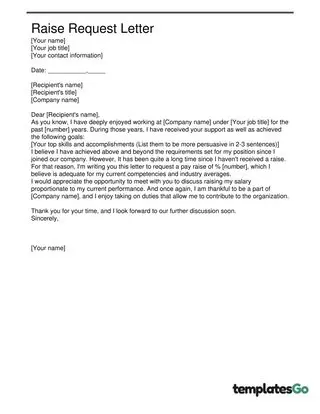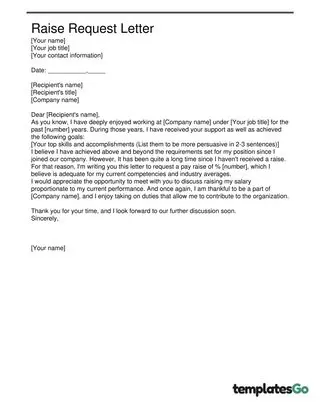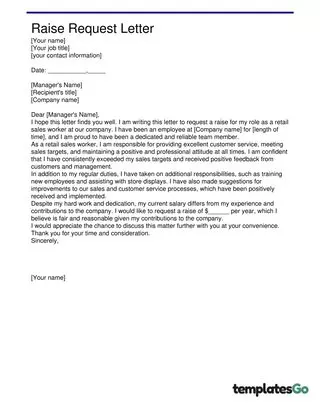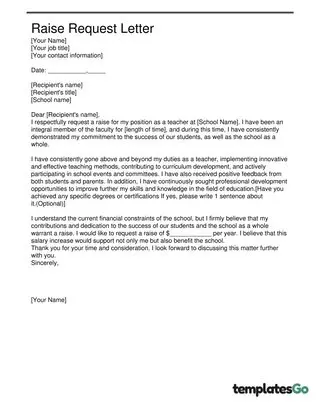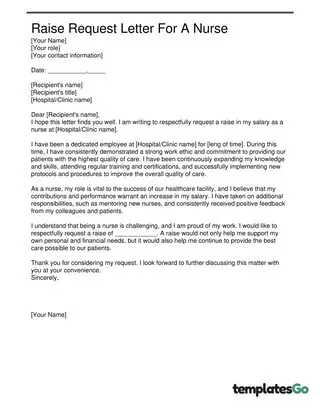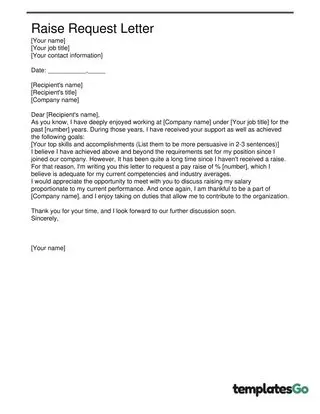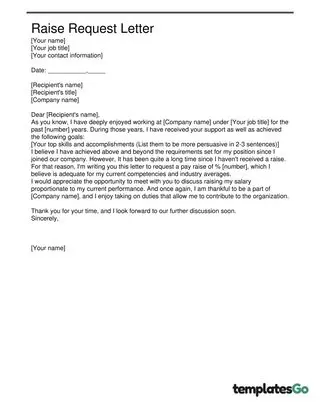What Is a Raise Request Letter
A Raise Request Letter is a formal document which employees give to their line managers, supervisor, or top management requesting an increase in their salary or hourly rates. Some might ask if it is important to have a written document for this? Well, the reasons why having a written request letter for a raise is crucial is simply because it provides a paper trail for all major business communication within the organization.
As opposed to just verbally communicating your demands to the employer, a written request letter provides a document of your proposal in regard to what you are asking for pay-wise and how you want these changes to be implemented.
What Needs to be Done Before Writing a Raise Request Letter
We have summarized the following recommended steps which can help you understand whether you are on the right track to deserving or asking for a raise.
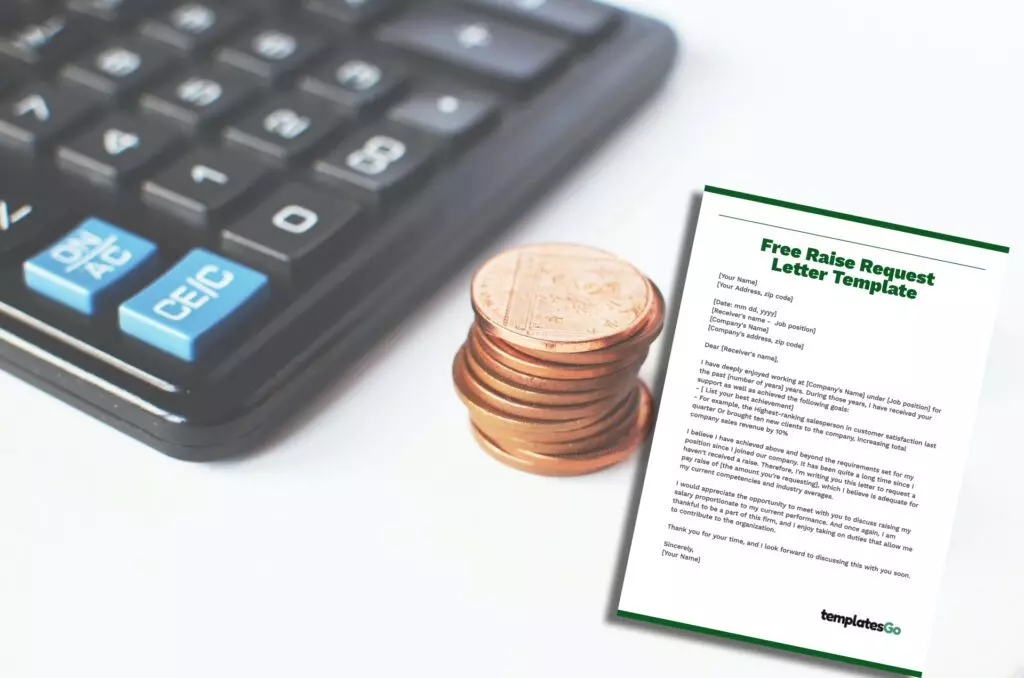
Evaluate your work
If you believe you deserve to receive a raise, but your boss might not remember all your achievements. It is highly recommended to list and quantify all your accomplishments and achievements from the time your employment commenced.
It is important to note that before you write a letter requesting a raise, you need to first pay close attention to the goals that you exceeded, any money that was saved during projects, and the profit that you have earned for the company during projects which surpassed the expected budgeted amounts.
Do your salary research
Before you send out your letter to request a raise, you must know your worth. This means knowing what others in your industry and company make. In order to do this, you can make use of websites such as 🔗Salary.com, Glassdoor Salary Calculator, and 🔗Talent.com where you can enter information about yourself which include but are not limited to your educational background, level of experience, job position held, skill level, seniority level and name of the company you working for. You will then receive an estimate of how much money different companies would pay someone with those specifications.
Pick the right time
Finding the perfect time and moment for sending a raise request letter can be confusing and extremely stressful because many might often find themselves writing a letter requesting a raise at the wrong time which results in your request being declined. So, if you are unsure of when request a raise letter should be written and sent, this section is for you, as we have further explained what time is appropriate for you to do this.
When your company is undergoing employee performance reviews: A majority of companies usually expect their employees to only ask for salary increments during the company’s annual performance review. Employees who have very positive reviews are always in a better position to utilize the opportunity and ask for a raise. You should also use your performance, accomplishments and achievements within the organization, areas where you added value or when you went beyond your job description or worked overtime etc. as examples of why you might deserve a raise.
When you have your company anniversary: Your seniority within the organization may have a huge impact on your raise request letter. If you have been employed at a certain company for many years, they often do employee anniversaries to acknowledge your service to the company. This might most probably be a good time to talk about a raise request and write a letter requesting a raise using your service as the main point.
When your company gains financial stability or success: If your company is in this case, this can be a crucial factor to determine whether the company is in the position of approving a pay raise. Employees need to be aware that pay raise approval for companies which have reached financial stability only occurs when the employee is already being paid a salary that is deemed as appropriate for the role which you hold in the company. Otherwise, if the employee is being paid a salary that is not sufficient for the role, then you have the right to send request a raise letter regardless of whether the company has financial stability or success.
For example, if you are working as a marketing assistant this requires certain skills, qualifications and knowledge. Therefore, it is not a position in which an employer can pay you US$4.25 per hour which is not only below the minimum wage but below the living standard of the country you are employed in. Due to the minimum wage in the United States being US$7.25 per hour or about US$1,218 per month for unskilled labor positions. Employers should note that you should only receive the minimum wage if you are employed in a position considered to be unskilled labor.
Address the right person
The raise request letter should be well structured for persuasion purposes and addressed to a person who knows your work history such as your line manager or supervisor and should not be addressed to any other individuals within the organization who does not know you. However, it is crucial to think about who will receive this letter.
In theory, you can consider sending the letter to a person who is in charge of bonuses and pay raises, or your immediate employer, for example, the Head of Department, your supervisor, or manager. Your supervisor might sometimes not be in the position to decide whether you can receive a pay increase or not, but sending this letter requesting a raise to your supervisor is sometimes wise. Because they are in the best position to back your work performance and acknowledge your accomplishments throughout your time in the company.
Furthermore, it is important to note that going above the individual who managed you personally and sending the letter to another person within the company might create a wrong impression.
Free raise Request Letter Templates
In order to save you time, we offer free editable templates to help you create this request letter faster, only in three (3) simple steps.
- Select your template.
- Answer our quick questions to generate your information into the template.
- Review and download your letter in just a few clicks.
Let us ease your writing process and speed the process for even better results!
Customizable Raise request letter template
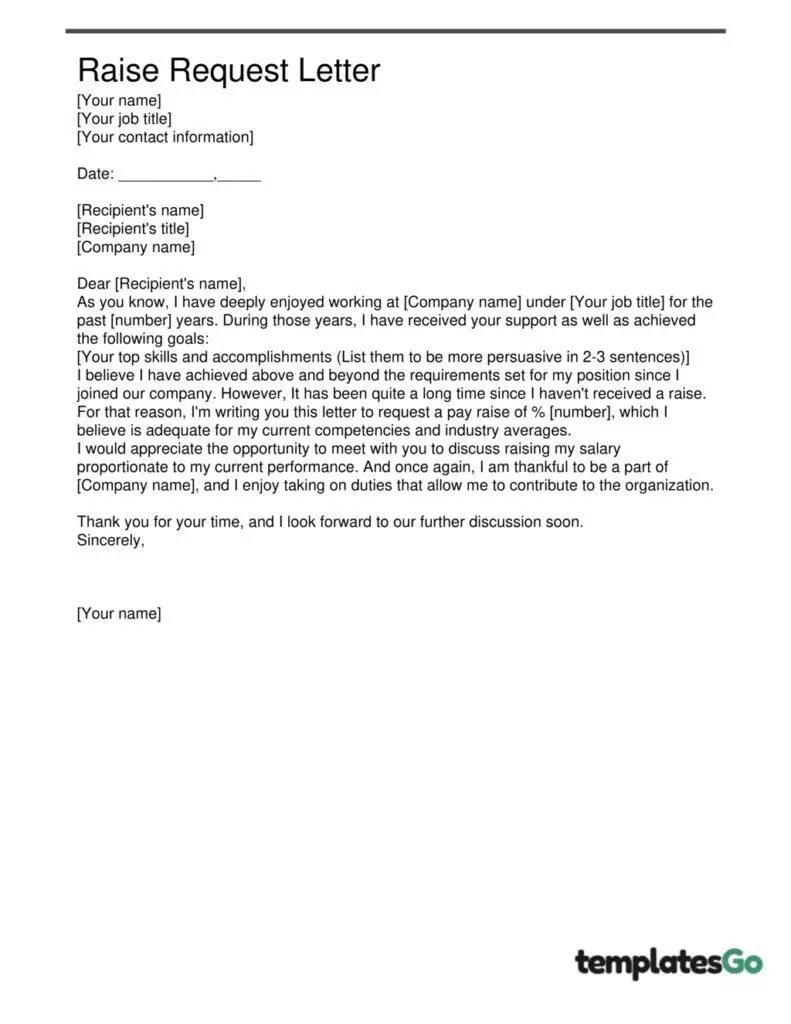
Who Should Write a Letter Requesting a Raise
It is important to note that not every employee who writes a Raise Request Letter deserves a pay raise if they are being paid according to the job pay standards and as per the Labour Laws of the country. For example, if an employee is working a labor job such as a genitor, nanny, cleaner, etc.
The employer is required by law to pay the employee not less than the minimum wage of the country if it is part of the unskilled labor category such as maid, genitor, nanny, street sweeper, builder etc. and not less than the living standard of your location. Therefore, if the employee is working a job that requires a certain level of experience, qualifications, or skills then the company should pay the employee an amount within the required pay range.
Here we have provided reasons regarding who deserves to send a letter to request a raise, to help you towards making that final decision of whether you should write a pay raise request letter or not. Employees who deserve a raise:
Employees who work beyond the job requirements
If you do more than the job requires such as assisting fellow co-workers, working beyond your required hours without being instructed to do so, exceeding quotas beyond the required quota agreement, taking on other responsibilities which are not part of your job description, providing suggestions of improvement to your supervisor or direct manager which assist in the growth of the organization etc. If you do any or more of the previously mentioned reasons, then you most definitely deserve a pay raise and can proceed in writing a request letter.
Employees who show initiative within the organization
If you are an employee who takes initiative by performing other duties or taking on other responsibilities without your line manager or supervisor asking you to do so. These duties or responsibilities can include but are not limited to finding other projects to work on or requesting for more projects that need to be completed as soon as possible, asking colleagues if there is something which you can assist them with, or come up with a solution which you noticed within the organization and present it to top management or senior managers.
Employees who are considered to be extremely dependable
Companies often want employees they can trust to not just perform their duties but provide quality work. It is different from just making sure that you get the work done, but making sure that the work you send out is of a certain standard that surpasses expectations. Companies are always on the lookout for employees who can deliver what is expected of them, so if you work well under little to no supervision and your line manager or supervisor rarely needs to micromanage your work performance and you are still managing to provide high-quality work then you deserve a raise.
Employees who seek to acquire new skills which are beneficial for the role or refine their skills
You might send a letter to request a raise if you are always trying to acquire new skills or trying to improve the skills which you already possess. For example, if you work in Marketing and gained a graphic design certificate to improve the quality of marketing content you produce. Another example can be that you gained a web development certification in order to acquire a new skill in front-end and back-end development. Moreover, employees of this category have the opportunity to increase their salary by submitting a 🔗promotion request letter for a higher position, offering more responsibility, greater challenges, and increased pay.
Employees who provide mentorship to colleagues
If you have long provided mentorship to other employees within your organization and helped them do their jobs well, then you might deserve a raise because mentoring other employees will benefit not only the employee you are mentoring but also the company.
Employees contributing to the success of the company
If you occasionally deliver high-quality work which does not only create value in your organization but always has a positive impact on the success of the company, then you most definitely deserve a raise. For example, if you work in the Marketing department and manage to convince a very well-known company to use your organization for a promotional ad campaign that is worth millions of dollars.
Tips
Once you defined which type of employees you are, then probably you have the ideas in your mind what you should write, right? Or simply use one of our raise request letter templates to customize your letter faster and more effective.
Conclusion
We are all aware of how challenging writing a Raise Request Letter can be due to the negotiations that follow both written and verbal between you and your employer. It is important for you to note that not all Raise requests get approved due to different reasons as per the organization, and it is your responsibility as an employer to duly inform the employees of these reasons.
As an employee, you have bargaining power, so if you have concrete evidence which proves that you deserve a raise and you do not receive it, it is always advised to reach out to top management to further discuss the matter if you are failing to reach a conclusion with your supervisor, line-manager or HOD (Head of Department). If your request is still rejected and you no longer wish to stay, it may be time to move on and seek new employment where your efforts will be appreciated. You can use our 🔗letter of resignation templates to help you through this process.

